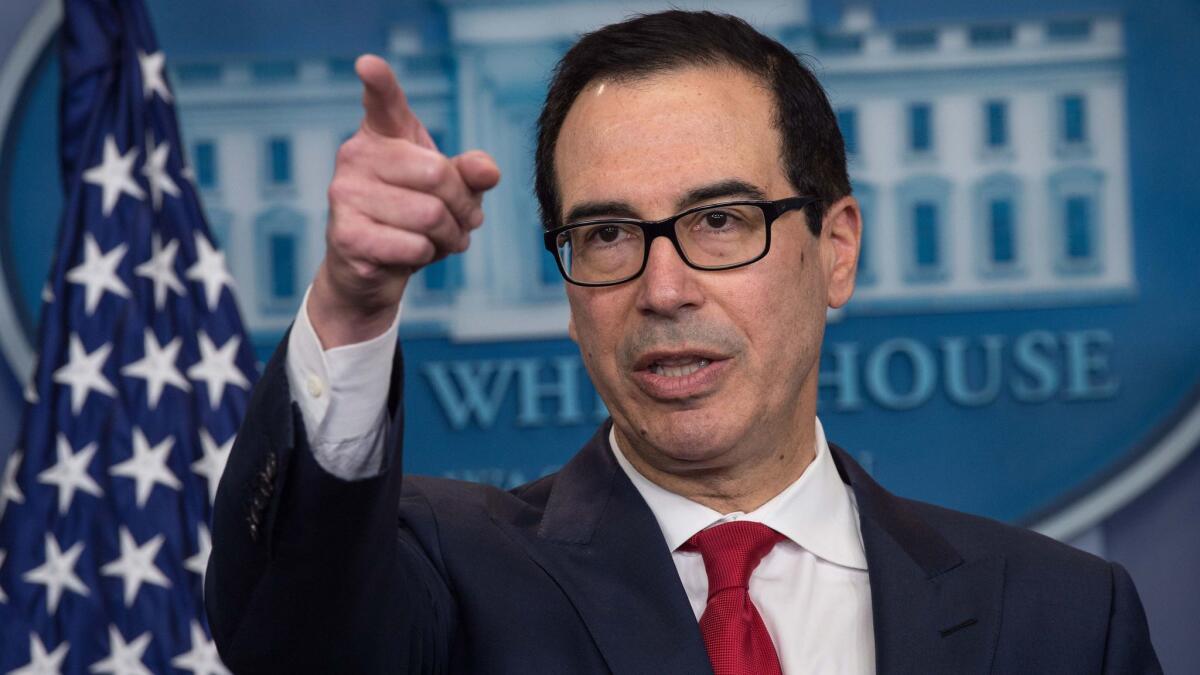Rule letting U.S. dismantle giant banks in crisis should stay, Treasury Department advises

- Share via
U.S. bank watchdogs should retain the ability to dismantle massive, complex financial firms after a collapse, but they should ensure the power is reserved “as an emergency tool for use under only extraordinary circumstances,” the Treasury Department said in a report released Wednesday.
The Trump administration’s disdain for the so-called orderly liquidation authority — granted to regulators after the 2008 financial crisis — is clearly reflected in the report, which cites “serious defects” in that part of the Dodd-Frank Act, which imposed new restrictions on financial institutions. The report urges lawmakers to focus instead on reforming U.S. bankruptcy laws to accommodate megabanks, a long-touted idea that has failed to clear Congress.
The new document is the latest in a series of Treasury reports prompted by President Trump’s call for a review of financial rules with an eye toward cutting red tape and spurring economic growth. The reports aren’t orders; they are meant to guide the independent agencies that would have to create or roll back rules.
Dodd-Frank gave the Federal Deposit Insurance Corp. — with coordination from the Federal Reserve and the Treasury secretary — authority to resolve complex financial firms in ways similar to its resolution of deposit-taking banks.
Treasury funds
With orderly liquidation authority, the idea is to convert complex financial firms in danger of collapse into healthy new firms as quickly as possible so they can continue to do business uninterrupted. Regulators’ ability under the rule to temporarily use Treasury funds to cover losses has led some Republican lawmakers to identify it as a bailout authority and seek its repeal.
Revisions suggested in the Treasury report include narrowing the FDIC’s powers, eliminating tax benefits for the “bridge companies” created by regulators and demanding tighter restrictions on using Treasury funds.
That wasn’t enough to satisfy House Financial Services Committee Chairman Jeb Hensarling, who has been the loudest critic of the liquidation power.
“Although I have been pleased or even excited about Treasury’s previous reports, this one disappoints,” the Texas Republican said in a statement, arguing that keeping the liquidation authority goes against Trump’s call to end taxpayer bailouts of banks. “On its face, this is inconsistent with the president’s core principle.”
Regulators’ perspectives
Key regulators, including Federal Reserve chief Jerome Powell, have long opposed getting rid of the wind-down authority. Another roadblock is that overseas regulators are unwilling to trust the U.S. bankruptcy courts to deal with resolution of global financial institutions.
“Without the assurance of [orderly liquidation authority] as an emergency tool, foreign regulators would be more likely to impose immediate new requirements on foreign affiliates of U.S. bank holding companies, raising their costs of business and harming their ability to compete internationally,” the report said.
The new report acknowledged the same concern regulators had during the Obama administration: that the bankruptcy system, though a preferred way of handling company failures, still may not be equipped to handle the collapse of a megabank.
“The current bankruptcy code was not designed to address the financial distress of a debtor engaged in activities such as significant derivatives transactions and short-term lending,” it said.
Marcus Stanley, policy director for Americans for Financial Reform, said he was glad to see the authority embraced in the report, but alarmed by specifics of the bankruptcy recommendations that he said “would create special privileges for big banks, rely on unrealistic assumptions, and in their current form would likely increase risks to the financial system.”
Hamilton writes for Bloomberg.
UPDATES:
2:50 p.m.: This article was updated with comment from Rep. Jeb Hensarling (R-Texas).
This article was originally published at 10:05 a.m.
More to Read
Inside the business of entertainment
The Wide Shot brings you news, analysis and insights on everything from streaming wars to production — and what it all means for the future.
You may occasionally receive promotional content from the Los Angeles Times.









